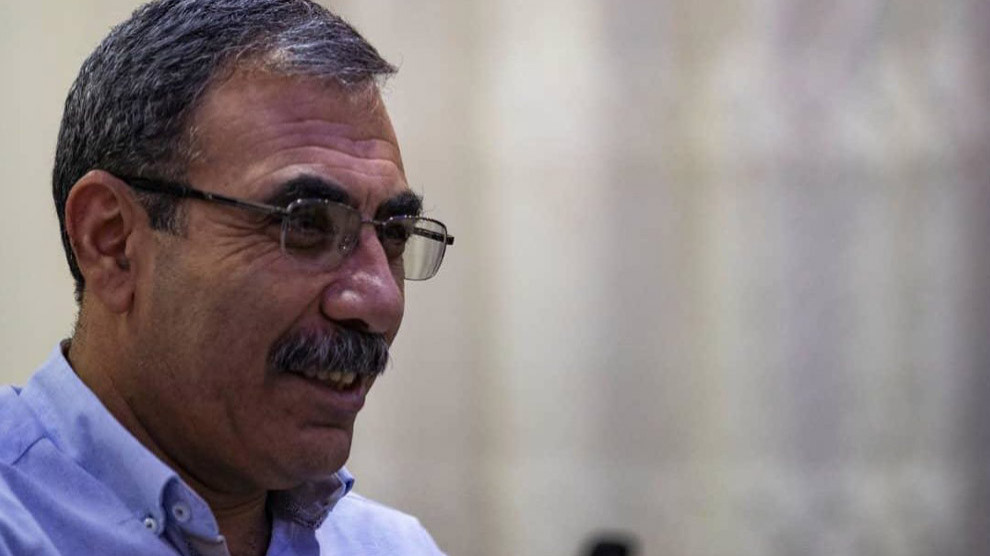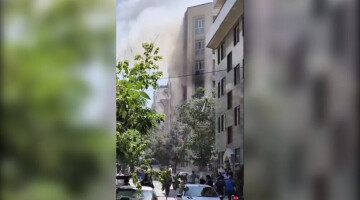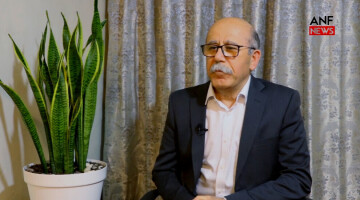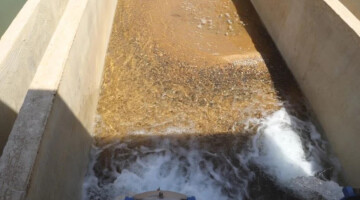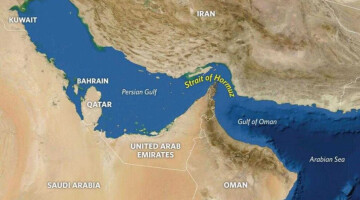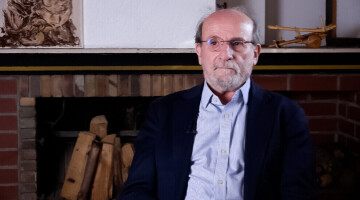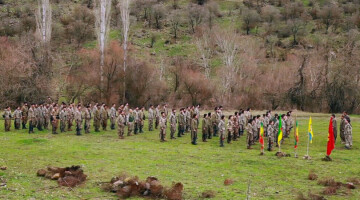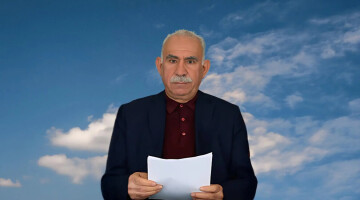Aldar Xelîl, a member of the Executive Council of TEV-DEM (Movement for a Democratic Society), has spoken in an ANF interview about the Idlib operation of the Syrian regime and Russia, the Turkish state's attempts at sabotage, the effects of the offensive on Afrin and the other Turkish-occupied territories, the diplomatic initiatives of the autonomous administration, talks with the Syrian government, the process of drafting a new Syrian constitution, the opening of ENKS offices in Rojava and the court cases of imprisoned ISIS members.
Let us start with the current issue of the Idlib. On the one hand, the operation by Russia and the Syrian regime is continuing, and on the other hand, the Turkish state is resisting. What is happening in Idlib?
What is happening in Idlib today is the result of earlier negotiations between Turkey, Russia and the regime. The Syrian war, which was started in order to enforce the line of the Muslim Brotherhood in Syria, later reached another level. Certain agreements have led to the gradual recapture of the sites held by the so-called opposition. These armed groups from East Ghouta, Hama, Homs, Daraa, Aleppo and many other places have been transported to Idlib. The accumulation of opposition in Idlib was planned. Already at that time it was known that Idlib would be the next place.
The Turkish invasion of Syria took place with Russian permission. Jarablus, al-Bab and Azaz have been handed over to the Turkish state in return for the transfer of armed groups from certain regions to other areas. This was followed by the occupation of Afrin and later Girê Spî (Tal Abyad) and Serêkaniyê (Ras al-Ain). Mutual concessions were made, which ultimately led to the concentrated presence of the jihadist groups in Idlib. Actually, the regime and Russia were planning to take Idlib already last year, but the Turkish state rejected this. It did not want the jihadists there to be liquidated immediately. Now the Syrian troops are 7 km left to reach Idlib. This situation may well continue for another six months. For the regime and Russia, to seize full control of the M4 and M5 highways is important at the moment. Perhaps they will move on to Idlib afterwards as a result of certain negotiations.
The Turkish army is deploying more and more troops in Idlib. In recent days, there have been repeated confrontations with the Syrian army and Russia. Two talks have taken place between Turkish and Russian representatives which have not led to any visible results. How should Turkey's war drum be interpreted?
It was clear from the outset that the Turkish state never thought of the Syrian people and never pursued a program to promote democratic opposition. Its only aim is to intervene in Syria through others. Today, this policy is pursued by Erdoğan and Bahçeli as a coalition. Bahçeli, for example, says quite openly that Northern Syria completely must first be taken in order to take Mosul and Kirkuk from there. Erdoğan also says this openly. They pretend to support the Syrian opposition and speak of the territorial integrity of Syria, but their intentions and practice point to their neo-Ottoman dreams and an occupation of the entire region. This is what Erdoğan wants. But at the moment it looks like he has a weak hand. The affairs in Syria have not developed according to his wishes. Even in Turkey and in his own party not everything is going according to his will. He is weakened. And the Russians are now signaling that they will only clear the way for him up to a certain point. Russia says to Erdoğan: "We have made certain concessions in our mutual interest, but we will not allow a complete occupation of the region”. In the meantime, even a withdrawal of Turkey from Syria is on the agenda.
The liberation of Afrin
Afrin is located in the vicinity of Idlib. The liberation of Afrin is also on the agenda in such a situation. Are there any initiatives from your side on this topic? Or let's ask like this: Has this issue been raised in talks with Russia?
First of all, it should be noted that Afrin, Girê Spî, Serêkaniyê and even Jarablus, Azaz and al-Bab are occupied territories that must be liberated. The liberation of Afrin is a priority issue for us at diplomatic, political and military level. It is not an issue that can be delayed, ignored or forgotten. However, certain developments and balances of power have so far delayed the liberation. However, the Idlib operation, the difficulties experienced by the Erdoğan regime and other factors are creating new conditions that promise hope. The offensive for Idlib is not over yet. After the liberation of Idlib, both the regime and Russia must demand an end to the Turkish occupation in the other areas. We are fighting for it anyway. Erdoğan wants to keep a part of Idlib in the worst case and is trying to prevent a weakening of its position in Afrin and the other occupied territories. In any case, he is not concerned with the protection of the groups he calls opposition. In my opinion, Erdoğan will not be able to hold on so simply. And we must interpret this development correctly and quickly set in motion a strong movement against the occupation.
Talks with the Syrian Government
After the occupation of Girê Spî and Serêkaniyê a new situation has arisen in the whole region. You held many diplomatic talks after the occupation. A delegation from North and East Syria is holding talks in Damascus. At what level are the talks with the Syrian Government, which are under Russian mediation, taking place and what results have they produced so far?
For the first time in its history, the Turkish state has come under such distress. For example, it has been waging war against the liberation movement in northern Kurdistan since 1984, with the political, military and financial support of the whole NATO. However, the invasion in Northeast Syria has been widely rejected. It was condemned mainly by Europe and the Arab countries.
Since the beginning of the war in Syria, we have been calling for a solution involving all the parties. If the regime today says that it agrees to talks on a political solution through Russian mediation, a new path opens up.
Has the Syrian regime said that it is prepared to enter into dialogue?
The regime has given positive signs. This is clear from the information that the Russian leaders have given us. It is a sign, but it should not be overestimated. It is not as if everything has been set in motion, alliances have been forged and a solution is emerging. It is, however, a positive step in terms of the acceptance of dialogue and negotiation.
If I understand this correctly, then no practical step has yet been taken?
We cannot say that a practical step has been taken. But it can be said that efforts are being made to find a political solution. Why? Because we have a project. We are for a solution to the Kurdish question in Syria. Without such a solution, Syria cannot democratise. Both are interdependent. We have always said that we are part of Syria. That is why we cannot say that we are talking to one side and not to the other.
Not only we, but also the regime, have this need. It is required by the political, military and economic situation in the country and by the crises in neighbouring countries such as Iraq, Lebanon, Palestine and Turkey. The war that has been going on in the country since 2011 forces the regime to look for ways out and possible allies. So far we cannot say that an alliance has been formed on certain points, but efforts to establish a dialogue are continuing. There is hope that a dialogue will develop.
You mentioned certain positive developments, what are they about?
We see it as positive when dialogue is established. We have been saying this since the beginning of the war in Syria. Nowhere in the world has a military solution ever been the final solution. We need a political solution. We wanted to be involved, for example, in the drafting of a new constitution and also to take part in the UN-led talks in Geneva. As we can now see, these talks are over, or at least they are no longer relevant, as they used to be. When these rounds of talks were opened, sixty per cent of the country was in the hands of the so-called opposition. But now they are stranded only in Idlib. The other occupied territories are in the hands of the Turkish state. So there are no more parties in question.
Should your talks with the Syrian regime lead to a political and constitutional agreement, would it be conceivable to sit at the Geneva negotiating table with the regime's delegation?
Our concern is not so much to be present in Geneva as to find a solution in Syria. If we reach an agreement with Damascus and Damascus recognises the autonomous administration, matters such as Geneva will no longer be so important. At the moment, nobody talks about Geneva any more anyway. Whether or not it will come to that is uncertain. A new constitution is currently on the agenda. It is essential that we be involved in this process. We must be able to express our opinion. It cannot be that the leadership of a large part of the country has no say in the constitution of that country. Nor can it be that the constitution is written and that we agree to it later. Any text that is written without the autonomous administration is doomed to failure.
So you attach importance to constitutional guarantees?
A legal system must be established so that a new war does not break out tomorrow or the day after. That is why we say that an alliance is better than the prospect of us and the regime going to war soon. Furthermore, the political success of the autonomous administration can also provide a model for the other regions of Syria, consolidating the country's unity and integrity.
ENKS must clarify its position
As a result of an internal dialogue, the ENKS [Kurdish National Council in Syria / Encûmena Niştimanî ya Kurdî li Sûriyeyê] has opened offices in northern Syria. How do you assess this?
It is important for national unity that the forces in Kurdistan come together. But I think that focusing on some political parties to this end is not right. There is not only the ENKS in Rojava. There are many Kurdish parties and all of them have the responsibility to create unity during this period. A Kurdish unity includes the Kurds' demand for freedom. This requires a position against occupation, annexation and demographic change. The ENKS is still represented in the structures of the so-called opposition armed groups. It has still not clarified its stand in relation to Afrin, Girê Spî and Serekaniyê. They persistently refuse to announce their stance in this regard. Despite all this, the autonomous administration has shown a very flexible approach to the ENKS. The ENKS should not only open offices, but also position itself against occupation and annexation. So there is also something for the ENKS to do, but it does not handle it well. It behaves as if opening offices is a service to the people. But the people have quite different problems. I, for example, as a citizen, ask which attitude this organisation, which sees itself as opposition and wants to work politically, has towards Afrin, Girê Spî and Serêkaniyê.
Trial of ISIS members planned
In Syria and Iraq, it is evident that the ISIS is working on a revival. Movements are taking place and there are large numbers of imprisoned ISIS members in the prisons and camps in northeastern Syria. What should be done with them? Are they to be tried or extradited?
The Syrian Democratic Forces and the Autonomous Administration have done the world a great service by defeating the ISIS. Through the efforts of the people and tens of thousands of martyrs and war-disabled fighters, the ISIS has been dealt a great blow. Now, however, a neglect is evident. We can see that the ISIS has thus begun a process of reorganization. We have appealed to all countries to take back their nationals. If that is not possible, we have called for the establishment of an international court. It seems that nobody wants to take this responsibility.
The autonomous administration maintains that ISIS supporters must be brought to justice. If there is no international court for this, the courts of the Autonomous Administration will have to deal with it. The start of this work is planned for the coming days.

